11 Jun 2019
Future of engineering previewed at 45th annual Lubbock Lecture
For the past 45 years in May, the Department of Engineering Science has invited a world-leading engineer to deliver the prestigious Maurice Lubbock Memorial Lecture. This year, speakers Sophie Mougard and Antoine Picon, of École des Ponts ParisTech, focussed on potential future of engineering. Here’s our look back at the highlights.
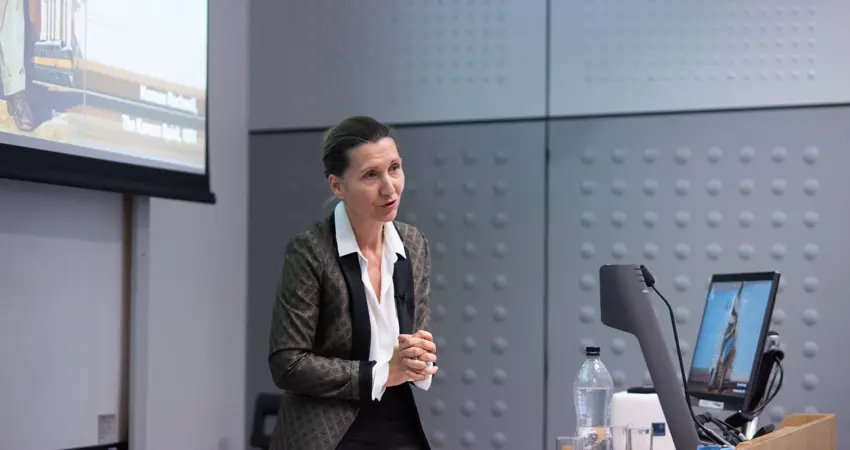
The 56-year old Thom Building, currently undergoing a spot of essential maintenance, was a hive of activity that morning, with caterers arriving and event staff laying out name badges.
The first wave of visitors arrived early afternoon for a preview of the Department’s fourth-year student posters. The undergraduates were on hand to talk through their work, as they waited for the arrival of the judging team who would decide which posters would win prizes in a range from categories, from subject areas such as Biomedical and Business, to Most Innovative and Most Impactful.
By 3pm the Department’s largest lecture theatre was filling up with academics, students and members of our alumni community. Professor 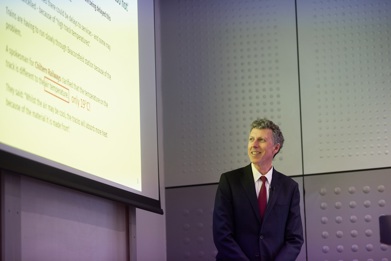 Chris Martin kicked off the day’s talks with a mini-lecture on his research developing models to simulate the movement of subsea pipelines.
Chris Martin kicked off the day’s talks with a mini-lecture on his research developing models to simulate the movement of subsea pipelines.
A member of the Department’s Geotechnical Engineering Group, Chris first studied at Oxford as a Rhodes Scholar, before going on to a successful career in industry. He returned to Oxford in 2000, and now undertakes his work in Marine Renewable Energy as a Fellow of Mansfield College.
Chris was followed on stage by fluid dynamicist Professor Richard Willden. Based at Oxford since 2007, Richard is a Tutorial Fellow at St Edmund Hall, currently leading two large research projects in tidal energy generation. His talk, ‘Design and Testing of Advanced Tidal Stream Tidal Array’, described his work redefining the upper limits of energy extraction from tidal flows.
After thanking Richard and Chris for their presentations, Head of Department Professor Lionel Tarassenko announced the winners of the fourth-year Poster Prizes. Selected by representatives from the sponsoring bodies, the winners were:
- The Rolls-Royce prize for most innovative exhibit: Matthew Wilson, ‘Locking Mechanism for a Breathing-Powered Prosthetic Arm’
- The Osborne prize for best civil engineering exhibit: Lukasz Skowron, ‘Bearing Capacity of Perforated Offshore Foundations’
- The GlaxoSmithKline prize for best biomedical engineering exhibit: Megha Hegde, ‘Neural networks for gestational age estimation of brain ultrasound’
- The UK AEA prize for best mechanical engineering exhibit: Benjamin Naylor, ‘Effects of Scour and Protection on Foundation Behaviour’
- The Sony prize for most impactful exhibition: Max Bain, ‘Fine-Grained Recognition in the Wild’
- The Ecrin Investments prize for best information and control engineering exhibit: Shu Ishida, ‘Robot Path Planning for Multiple Target Regions’
- The BP prize for most comprehensive exhibit: Jonathan Collins, ‘Derivation of Seismic Fragility Curves for Typical Nepalese Houses’
- The EDF prize for most engaging speaker: Michael Newsome, ‘The effect of sleep on human intervertebral disc nutrition’
- The EIBF prize for best Engineers in Business Project: Jian Lim, ‘Bayesian Optimisation for Automated Machine Learning’
- The Oxford Engineering Alumni Association Runner-up Project Presentation Prize: Andreea-Maria Oncescu, ‘Failure detection of low-cost wearable devices using recorded data and reports’
- The Oxford Engineering Alumni Association Prize for best Project Presentation: Diarmid Xu, ‘Performance of Construction Support Fluids: Experimental Testing’
- Schools Prize Winner: Jonathan Collins, ‘Derivation of Seismic Fragility Curves for Typical Nepalese Houses’
The delegates took the chance to stretch their legs, network over refreshments and take a closer look at the work of all the poster exhibitors, as well as extending their congratulations to the winners. It was also a great opportunity for the fourth-years to pick the brains of Oxford alumni about their post-graduation careers.
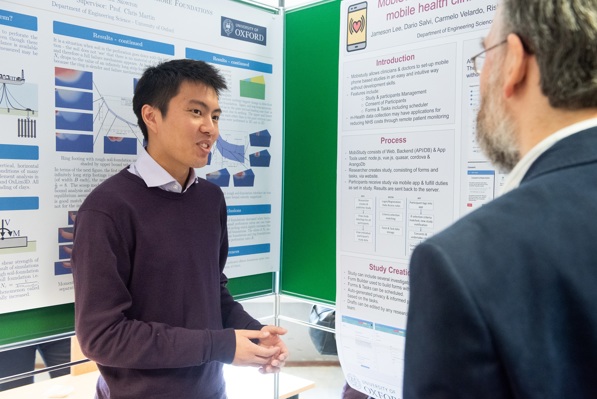
At 5pm, keynote speakers Dr Sophie Mougard and Professor Antoine Picon took to the stage as the delegates filed back into a packed auditorium.
Sophie was appointed President of the École des Ponts ParisTech, the oldest engineering institution in the world, by the President of the French Republic in 2017. She has been a member of the Academy of Technologies since 2014. Antoine, who teaches the history of engineering and urban technologies, is also Chairman of the Foundation Le Corbusier.
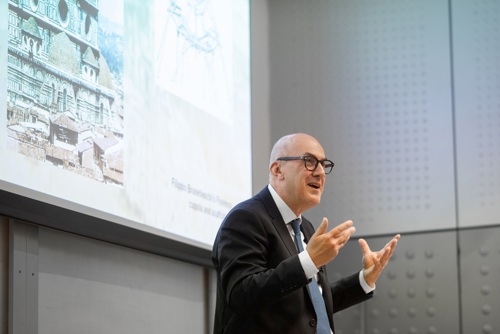 Their lecture, ‘Engineering at the Crossroads: A 21st-Century Vision from Across the Channel’, asked the question: where is engineering going? They told the audience that revolutions in knowledge and new challenges such as the digital revolution and environmental crisis all call for innovation in engineering education and professional practice.
Their lecture, ‘Engineering at the Crossroads: A 21st-Century Vision from Across the Channel’, asked the question: where is engineering going? They told the audience that revolutions in knowledge and new challenges such as the digital revolution and environmental crisis all call for innovation in engineering education and professional practice.
The speakers began by placing our current turning point within the broader history of engineering, before focusing on the teaching philosophy of the École and the way this long-standing institution works to stay current with the challenges each generation of its graduates will face.
Following a final vote of thanks from Lord Avebury, Lyulph Lubbock (Chairman of the Lubbock Trust, an educational charity dedicated to expanding opportunities at Oxford and specifically Balliol College), the group moved to the nearby Holder Café for canapés and professional networking over drinks.
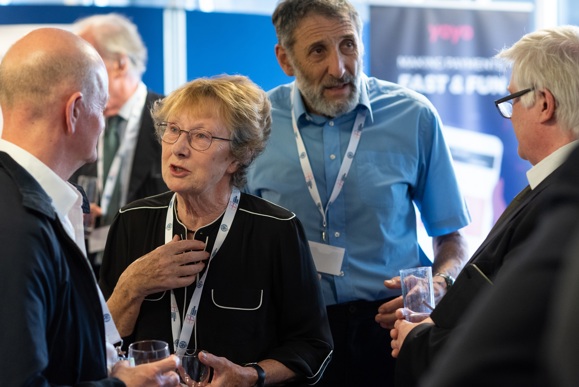
Another successful Lubbock Lecture is over, but there are more events planned, including the Jenkin lecture as part of the University Alumni Weekend in September. Take a look at our events listings and upcoming outreach events. And all these lectures will be made available on our Youtube channel; check back soon to watch them.




